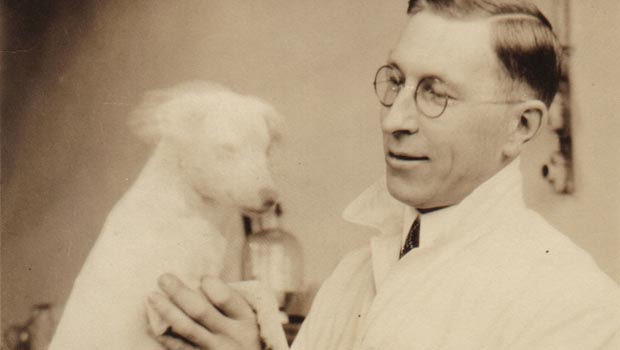Dr. Banting: Called a Failure, Discovers Insulin

I often stare at an old photograph of Dr. Frederick Banting, the discoverer of insulin, to get ideas. I am inspired by his sheer tenacity. Against all odds, he succeeded in bringing insulin treatment into the world. I am completely in awe of how he had an idea and gave up everything right down to his old Ford to continue his research. He may have been trained as a surgeon with a special interest in orthopedics, but he forever changed the way diabetes is treated.
After Dr. Banting finished his residency at the Sick Children’s Hospital in Toronto and the hospital failed to give him an appointment on staff, he set up practice in London, Ontario. Unfortunately, during his first month of practice, he only saw one patient. He needed a paying job, so he took a position as an assistant professor of physiology at the University of Western Ontario.
One October evening in 1920, Banting was preparing to give a lecture on diabetes, a topic that he knew nothing about; he didn’t even know how to spell the disease. While he was preparing, he was entranced by an article that had been published the month before on pancreatic stones, and how clamping the pancreatic duct could lead to regeneration of the injured pancreatic tissue. The islet cells remaining after the injury secreted a hormone directly into the bloodstream, which potentially had a controlling power over glucose metabolism. The article “Relation of Islets of Langerhans to Diabetes” inspired Banting so much that he scribbled down in his notebook, “Diabetus…Ligate the pancreatic ducts of dog. Keep dogs alive till acini degenerate leaving islets. Try to isolate the internal secretion to relieve glycosurea (sic).”
What followed was a process filled with medical politics, intrigue, and determination. Some colleagues ridiculed him for his research, and the head of his department said his experiments on insulin were unsuccessful in a 1921 letter. He ran out of money and had to scrape what he could together to continue his research. He persevered and the first injection of insulin was given on January 11, 1922 to 13-year-old Leonard Thompson, a boy who was surely going to die until Banting’s solution came out of the blue to rescue him.
< As Dr. Banting himself later said, insulin is a treatment, not a cure. His solution was ingenious, but it raises many questions we’re still trying to answer about how the pancreas works. As we look back on his work, our team and other researchers have searched for the gene that expresses itself to regenerate injured pancreatic tissue. The Reg gene protein, which is usually only expressed during embryonic development, has recently been found to turn on again later in life when there is an injury to the pancreas. We and other teams have shown that when the Reg gene protein is placed in proximity to human pancreatic ductal tissue, new islets containing beta cells are formed. If we can protect those beta cells from attack by the immune system, we might be able to achieve insulin independence. As we search for innovations that may result in insulin independence, we actually are using a concept of Dr. Banting’s that is more than 90 years old. That just shows the genius of his hunch. There are still many questions to answer, but we are on our way, thanks to Dr. Banting, and his willingness to give up everything to follow his scribbled idea on how to treat “Diabetus.” His story teaches us that our paths may take us far from what we have planned for ourselves, but those digressions may still lead to great innovation. Ideas, even ones scribbled down in the middle of the night, may have the power to change the world. To learn more about Dr. Banting’s life and work, or to visit his the historic site where insulin was first invented, go to http://bantinghousenhsc.wordpress.com/ or https://www.facebook.com/BantingHouseNHS.
Thanks for reading this Insulin Nation article. Want more Type 1 news? Subscribe here.
Have Type 2 diabetes or know someone who does? Try Type 2 Nation, our sister publication.